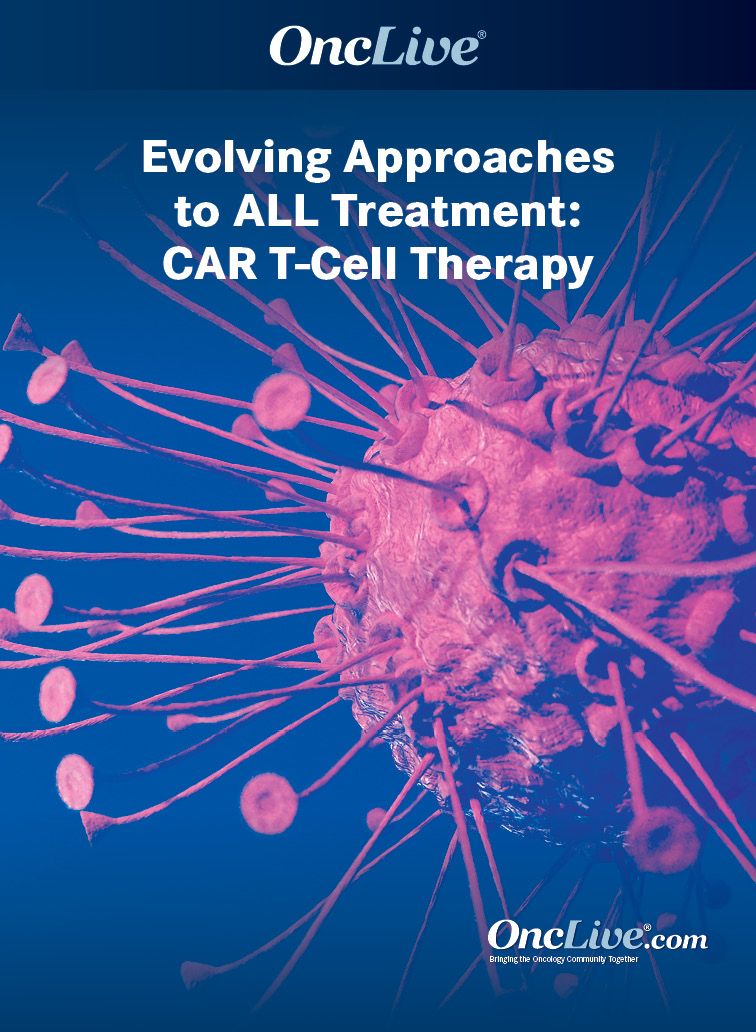Publication
Article
Supplements and Featured Publications
Obe-cel Provides Favorable Safety Profile, Expands Potential Treatment Options in B-ALL
Author(s):
Paul J. Shaughnessy, MD, discusses the unique properties of obecabtagene autoleucel in B-cell acute lymphoblastic leukemia and how findings from the FELIX trial support further research into the benefits of CAR T-cell therapy in patients with hematologic malignancies.
Paul J. Shaughnessy, MD

The CAR T-cell therapy obecabtagene autoleucel (obe-cel) represents a promising treatment avenue for adult patients with B-cell acute lymphoblastic leukemia (B-ALL), a population with historically limited treatment options, according to Paul J. Shaughnessy, MD.
The phase 1/2 FELIX trial (NCT04404660) is evaluating the safety and efficacy of obe-cel, an agent that targets CD19, in adult patients with relapsed/refractory B-ALL. This trial is currently recruiting patients, with primary end points of overall response rate and minimal residual disease (MRD) negativity.1
“Any patient with relapsed/refractory [acute lymphoblastic leukemia (ALL)] has an unmet medical need, and CAR T-cell therapy fits that role. The ability to treat even more patients with less toxicity and acceptable efficacy is important for this patient population,” Shaughnessy said in an interview with OncLive®.
In the interview, Shaughnessy discussed the unique properties of obe-cel, how the adverse effect (AE) profile of this agent may fulfill an unmet need in the high-risk B-ALL population, and how findings from the FELIX trial support further research into the benefits of CAR T-cell therapy in patients with hematologic malignancies.
Shaughnessy is the medical director for the Adult Blood and Marrow Stem Cell Transplant Program at Methodist Hospital in San Antonio, Texas.
OncLive®: How have CAR T-cell therapies affected the treatment paradigm for patients with B-ALL?
Shaughnessy: CAR T-cell therapies have affected the treatment paradigm for B-cell ALL a great deal, especially in the adult patient population. B-cell ALL is a very high-risk leukemia. Patients may respond well [to standard treatments] yet be at high risk for relapse. Even when we do allogeneic stem cell transplants on adult patients with B-cell ALL, we still see a number of these patients relapse.
CAR T-cell therapy for adults with B-cell ALL has given us many therapy options and meets an unmet medical need in patients with high-risk B-cell ALL. CAR T-cell therapy has changed the treatment paradigm, and now we’re looking at moving this treatment into earlier lines of therapy, maybe after the first line, or into MRD-positive disease. Moving CAR T-cell therapy into these clinical situations may help us improve outcomes for patients in the long term.
Obe-cel is 1 CAR T-cell therapy under investigation. Compared with some of the other agents that have been investigated and approved, how does this CAR T-cell therapy differ?
Among the CAR T-cell therapies for B-cell ALL, we often see the expected AEs of CAR T-cell therapy, such as cytokine release syndrome [CRS] in as many as 70% of patients and neurotoxicity in 30% to 50% of patients. These can be significant and affect the care and hospitalizations of these patients.
With obe-cel, although more data and longer follow-up will be needed, we seem to see less CRS overall and less neurotoxicity, and patients are responding well. The early data appear to show good response rates with some durability and acceptable rates of CRS and neurotoxicity.
This treatment is good to have for patients who have often been heavily treated and may not be able to tolerate many of the AEs from other CAR T-cell therapies. Reducing the AEs yet maintaining efficacy looks promising with obe-cel, and we want to see more data in the future.
The FELIX trial is further investigating CAR T-cell therapy in patients with B-ALL. What findings from this study have been reported so far?
The FELIX trial is looking at obe-cel, the CD19-targeted CAR T-cell therapy for adults with relapsed/refractory B-cell ALL. [So far], in patients who have failed 2 or more lines of B-cell ALL therapy, we see good response rates [with obe-cel]. [In an interim analysis, with a median follow-up of 6.4 months], 70% of patients responded and had acceptable rates of CRS and neurotoxicity, with no unexpected toxicities. The FELIX trial demonstrates that this autologous, CD19-targeted CAR T-cell therapy looks promising, may have an improved AE profile, and may maintain effective response rates in this patient population.
How could this trial potentially address unmet needs in this patient population, particularly among frail patients or those from low-income backgrounds who may not be able to manage AEs as appropriately as other patients?
Any adult patient with relapsed or refractory ALL has an unmet medical need. Although we have several CAR T-cell therapies to choose from, getting patients on CAR T-cell therapy can be difficult. Often, patients need to travel far to centers to receive CAR T-cell therapy. They also need a caregiver, and they need to spend time in the hospital. Additionally, dealing with the AEs of CAR T-cell therapy can be difficult in these often heavily treated patients.
Having less CRS and neurotoxicity makes this treatment more available for patients, especially if they’re in their 60s or 70s when they’re going through therapy. In some centers, like Methodist Hospital, we [may also be able to] provide outpatient CAR T-cell therapy for many of these patients to make their treatment easier for them and their caregivers and family members. [Patients may] be able to receive these therapies and then return home to their referring oncologists, hopefully in a timelier way.
What is the importance of referring patients with B-ALL or other hematologic malignancies to clinical trials evaluating CAR T-cell therapies?
Referring patients to clinical trials is important in general, and any adult with a B-cell ALL needs specialized therapy. The CAR T-cell treatments [that are] now going through clinical trials and becoming FDA approved, [are advancing] because of clinical research. Continuing to refer patients for clinical research studies to advance the science of care for these patients will help all patients with B-cell ALL and meet these unmet medical needs.
We still have much work to do. More research needs to be done to further improve efficacy rates, reduce toxicities, and move CAR T-cell therapy up to earlier lines so we can treat patients sooner and prevent relapses or treat patients after their initial therapy when they’re healthier, [instead of after] many lines of therapy when they may be more frail and harder to treat. Clinical research is addressing all these needs, and the more we can refer patients and the sooner we can refer patients, the better.
Beyond CAR T-cell therapy, what other agents under investigation in B-ALL would you like to highlight?
There are many new data coming out using the bispecific antibody blinatumomab [Blincyto] earlier in lines of therapy for B-cell ALL. Can this give us better response rates and fewer MRD-positive patients? [Can this] get more patients into complete MRD-negative remission so we can go to allogeneic transplant? There is more we can do with blinatumomab to hopefully reduce toxicities with some of the chemotherapy we use and still get excellent response rates and get patients to transplant. In many ways, moving CAR T-cell therapy to earlier lines is also an interesting approach and may help us get more complete remissions and MRD-negative remissions for our patients.
What is your main message regarding CAR T-cell therapy in B-ALL and the FELIX trial?
As an investigator who has been involved in the FELIX trial, used obe-cel, and treated many patients with B-cell ALL, I am impressed with the response rates [seen with obe-cel] and its ability to control aggressive, advanced B-cell ALL. I’ve seen some of these patients have durable remissions for well over a year in follow-up and patients who are doing well in complete remission.
As someone who has used many CAR T-cell therapies, the incidence of CRS and neurotoxicity [with obe-cel] has been acceptable and easy to manage. Overall, these patients have done well. [The progress in the] FELIX trial and the use of obe-cel hopefully represents a step forward in treating adults with B-cell ALL. We’ll continue to see, with more follow-up, [whether we can] maintain these excellent response rates and control the AEs and the incidence of CRS and neurotoxicity. [Hopefully], we’ll continue to see these patients do well with longer follow-up.
Reference
A study of CD19 targeted CAR T cell therapy in adult patients with relapsed or refractory B cell acute lymphoblastic leukaemia (ALL). ClinicalTrials.gov. Updated August 31, 2022. Accessed January 4, 2023. https://clinicaltrials.gov/ct2/show/NCT04404660










